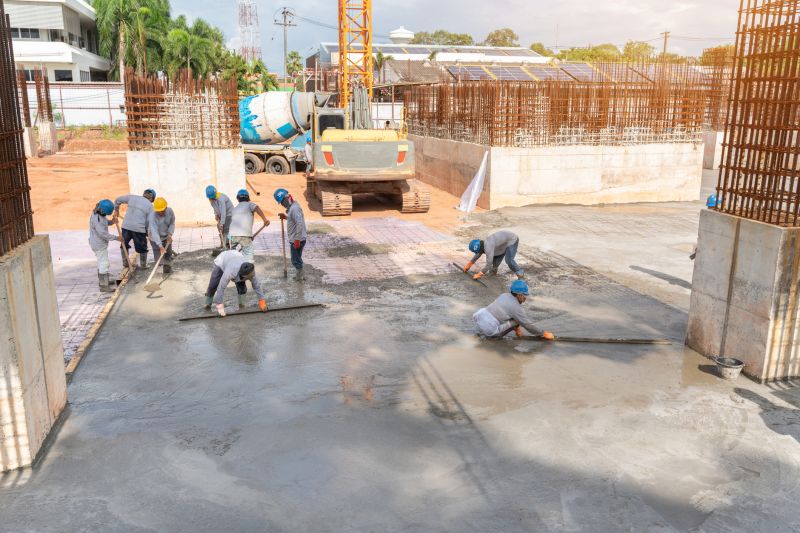Ultimate Selection Of Products For Concrete Installation Success
Access a comprehensive range of products designed to streamline concrete work and ensure long-lasting results.
 Concrete installations require a variety of specialized products to ensure durability, safety, and proper functionality. From foundational elements to finishing touches, selecting the right materials can significantly impact the longevity and performance of your project. Whether you're pouring a new driveway, creating a patio, or installing concrete structures, understanding the different product options available is essential for achieving successful results.
Concrete installations require a variety of specialized products to ensure durability, safety, and proper functionality. From foundational elements to finishing touches, selecting the right materials can significantly impact the longevity and performance of your project. Whether you're pouring a new driveway, creating a patio, or installing concrete structures, understanding the different product options available is essential for achieving successful results.
Top Overall Option
Concrete Reinforcement Mesh
Concrete reinforcement mesh is a versatile and widely used product that provides structural support to concrete slabs and surfaces. It helps distribute loads evenly, reduces the risk of cracking, and enhances overall durability. Suitable for various applications such as driveways, floors, and patios, reinforcement mesh is an essential component in many concrete projects. Proper installation and placement are key to maximizing its benefits, making it a reliable choice for both DIY enthusiasts and professionals.
Types of Products For Concrete Installations
Concrete Mix
A fundamental component for any concrete project, available in various formulations for different strength and setting time requirements.
Concrete Admixtures
Additives that modify the properties of concrete, such as setting time, workability, or durability.
Form Release Agents
Products used to prevent concrete from sticking to forms, ensuring clean removal and a smooth finish.
Reinforcement Mesh
Steel or synthetic mesh used to reinforce concrete and prevent cracking under load.
Expansion Joints
Materials placed between concrete sections to accommodate movement and prevent cracking.
Concrete Sealers
Protective coatings applied to finished concrete surfaces to resist stains, water, and wear.
Curing Compounds
Products that retain moisture in concrete during curing, promoting proper hardening.
Concrete Edging Tools
Tools designed for shaping and finishing edges of concrete surfaces for a clean look.
Concrete Vibrators
Equipment used to eliminate air pockets and ensure proper compaction of concrete.
Surface Finishing Tools
Tools such as trowels and floats used to achieve desired surface textures and smoothness.
Concrete Pumps
Machinery for transporting liquid concrete to hard-to-reach areas on the job site.
Anchor Bolts
Hardware used to attach structures securely to concrete foundations.
Concrete Dyes and Colorants
Products used to add color to concrete surfaces for decorative purposes.
Formwork Materials
Plywood, metal, or plastic forms that shape the concrete during setting.
Concrete Repair Patches
Materials designed to fix cracks or surface damage in existing concrete structures.
Popular Choices
A common choice for various projects, available in different strengths and formulations.
Widely used to strengthen concrete slabs and reduce cracking risks.
Popular for protecting finished surfaces from stains and wear.
Frequently used to allow for movement in large concrete slabs.
Commonly applied to ensure proper curing and hardening of concrete.
Essential for achieving smooth and textured finishes on concrete surfaces.
Help achieve clean form removal and smooth finishes.
Popular for ensuring proper compaction and eliminating air pockets.
Used frequently for shaping edges in decorative or functional concrete work.
Commonly used for attaching fixtures and structures to concrete foundations.
Popular for decorative concrete projects to add color and visual interest.
Widely used to shape and contain concrete during setting.
Frequently chosen for fixing cracks and surface damage in existing structures.
Concrete installation products range from basic tools to advanced additives and reinforcement materials. Proper preparation and the right supplies can help prevent common issues such as cracking, uneven surfaces, or inadequate curing. Investing in quality products suited for your specific project scope can facilitate smoother workflows and more consistent outcomes.
When planning a concrete project, consider the environment and the specific demands of the installation site. Factors like load-bearing requirements, exposure to weather elements, and aesthetic preferences influence the choice of materials. By selecting appropriate products, you can enhance the structural integrity and appearance of your concrete work, ensuring it meets your expectations and withstands the test of time.
This guide aims to highlight a broad spectrum of products suitable for concrete installations, helping homeowners and contractors alike make informed decisions. From foundational reinforcements to finishing tools, the right products can make a significant difference in the success of your project. Remember to always follow manufacturer instructions and consult with professionals when necessary to optimize your results.
Key Buying Considerations
- Project scale and scope to determine the quantity and type of materials needed.
- Compatibility of products with the specific concrete mixture or application.
- Environmental conditions such as weather and temperature during installation.
- Durability requirements based on load-bearing and exposure to elements.
- Ease of use and application methods suitable for DIY versus professional use.
- Curing time and how it impacts your project timeline.
- Compatibility of reinforcement materials with concrete mix and site conditions.
- Surface finish preferences, whether smooth, textured, or decorative.
- Budget constraints without compromising essential quality and safety standards.
- Availability of products locally or through reliable suppliers.
- Safety features and handling instructions for each product.
- Long-term maintenance and protective features like sealers and coatings.
- Environmental safety and potential VOC content of products.
- Compatibility with existing structures or materials if retrofitting.
- Manufacturer reputation and product reviews to ensure reliability.
